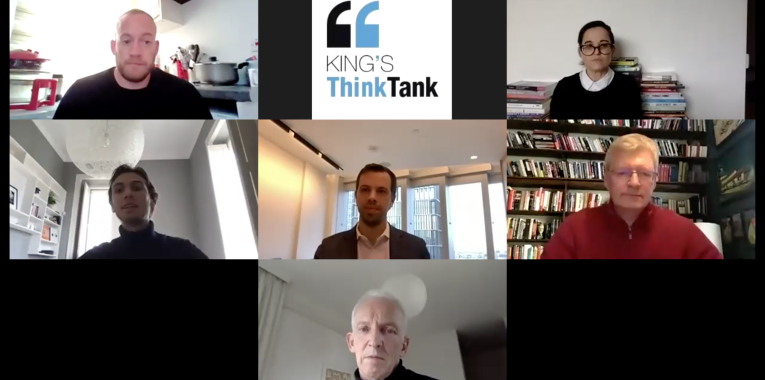The 2021 Federal Election brings substantial political changes for Germany. After 15 years, Angela Merkel will no longer be the chancellor, as her party, the center-right Christian Democrat Union (CDU), has suffered their worst ever result, with just 24.1% of the vote. The Voters favoured the center-left Social Democratic Party for Germany (SPD), which received their best result since 2005, the even further left Green party, and the classical liberal Free Democratic Party (FDP). These three winners of the election are forecast to constitute the most likely ruling coalition, aptly dubbed the “traffic light” coalition after their party colours. While negotiations are ongoing and an alternative party arrangement remains possible, if unlikely, Eastern European (EE) states are already able to anticipate their strategies for interaction with Berlin.
Continue reading “Germany’s New Government: hope or old concerns for Eastern Europe?”Tag: European Affairs
The Rassemblement National: mainstreaming far-right ideas in French politics
The Rassemblement National (RN) is a populist right-wing party that plays a prominent role not only in French society, but also in politics. The party was founded in 1972 on the premise of uniting dispersed far-right movements in France and continues to maintain a very strong nativist ideology and discourse. This can be summed up by the idea of a préférence nationale (national preference) which seeks to stop the inflow of immigrants who compete with French workers and ensure that only French people benefit from social welfare. Although the RN has never been in office, they have had a significant amount of influence on French politics. In order to understand the continued success of the RN, it is important to look at the factors that have enabled this.
Continue reading “The Rassemblement National: mainstreaming far-right ideas in French politics”Limiting Lies: The Need for Greater Regulation of the Tech Industry in Europe
Although Europe exercises some of the world’s strictest policies towards the technology sector, the EU is considering passing new regulations aimed at ‘gatekeeper’ platforms, including Amazon, Facebook, Apple, Google, and Microsoft, to force big tech companies to remove dangerous content, hate speech, and misinformation. Renewed efforts by the EU to curb the spread of hate speech and misinformation are prompted by concerns over the recent growth of extremist groups, both within Europe and internationally, that are strengthened by their online communities.
Continue reading “Limiting Lies: The Need for Greater Regulation of the Tech Industry in Europe”European waters and migration during the pandemic
As a French citizen studying in the UK, encounters with migrants while traveling across the English Channel have become a regular experience. Whether you take the Eurostar from Calais to Dover or the boat from Ouistreham to Portsmouth, you cannot ignore the reality of their situation, especially during the pandemic. One memory will always remain with me: I arrived by car at the harbour of Ouistreham when suddenly a group of migrants started chasing after the lorry ahead of us. They tried to jump on it and, unsuccessfully, attempted to open the back door of the lorry. This shocked me and at that moment I felt privileged. I had a passport and the right to legally cross the border. Meanwhile, they were illegal immigrants attempting something incredibly dangerous to be able to lead a better life. I was unable to help them and felt embarrassed that this was happening in a European country like France. But this is the reality of the lives of many migrants attempting to cross the borders to European countries.
Continue reading “European waters and migration during the pandemic”The Split Self: Europe in the Age of Populism European Affairs Event Review
From Friday 13th to Sunday 15th of November after months of excel spreadsheets, plenty of emails, slack notifications, and careful planning; the Policy Centre of European Affairs’ second event came to fruition: the KTT Policy Hackathon.
Loosely inspired by MIT’s virtual hackathons, it presented a 24-hour challenge to finish a comprehensive policy brief in teams of three to four people. Participants were invited to debate the issue of European cohesion in the age of populism: How should the EU strengthen European identity to counterbalance Eurosceptic forces?. Over 24 hours the participants debated and discussed questions of European identity, how to counter Eurosceptic forces and much more, to come up with a policy paper that provided solutions to these questions. The hackathon saw 18 participants come together in 5 small teams and successfully present a diverse range of remarkable policy briefs on Sunday morning.
Continue reading “The Split Self: Europe in the Age of Populism European Affairs Event Review”The European Union and the future of post-Covid multilateralism
The novel coronavirus pandemic has already sparked much speculation on how the international order as we know it will undergo profound changes, with suggestions that it will forever be divided between what happened BC (before coronavirus) and AC (after coronavirus). If some lament, others cheer and others are not yet willing to accept the end of the liberal international order, yet few would neglect that a return to the past is unlikely. The pandemic has exacerbated pre-existing dynamics from protectionism and nationalism to great power politics and ideological competition. While this definitely means that the health crisis has highlighted the deep flaws of our current multilateral system, it has simultaneously exposed the world’s tremendous need for an international system of collective problem solving, of which, this article argues, the EU should be at the forefront.
Continue reading “The European Union and the future of post-Covid multilateralism”Tackling the EU democratic deficit by increasing the representativity of the European Parliament
- Background
In recent years, political participation of European citizens has been decreasing. Voter turnout has declined from 62% in the first European Parliament (EP) elections in 1979 to 43% in 2014. At the same time, the 2018 Eurobarometer shows low levels of trust of citizens in the European Parliament (50%) and the European Commission (46%). Many critics argue that the EU suffers from a democratic deficit, noting that EU decision-making procedures are either inaccessible or excessively complex for ordinary citizens to comprehend and engage with. The latter accusation contradicts the notion of liberal democracy, which is one of the EU’s core values and a condition of membership.
Continue reading “Tackling the EU democratic deficit by increasing the representativity of the European Parliament”Will the EU finally tend its own garden?
Why the talk of a new ‘European awakening’ in the defence sphere is just rhetorical window-dressing.
‘We will not protect the Europeans unless we decide to have a true European army.’ Ever since Emmanuel Macron uttered these words in November 2018, the idea of a European Army is back in vogue. A year and a half later, it might appear like the stars are aligning to create the perfect conditions for a ‘golden Era’ of European defence cooperation.
The worrying rise of authoritarian police responses to protests in Europe
The right to protest is a fundamental right in European democracies. Yet in recent times, states have infringed upon this right, whether through legal restrictions such as the declaration of a state of emergency, or through more tangible responses such as policing forces on the ground. This is a worrying trend, which throws into question European governments’ commitment to protecting this right.
Continue reading “The worrying rise of authoritarian police responses to protests in Europe”
The EU’s (Next) Asia Strategy
The ascension of Josep Borrell to the position of European Union (EU) High Representative (HR/VP) on 1 December 2019 places an EU strategy for Asia that reaches beyond ‘connectivity’ at the center of the political agenda towards the region. This article does not seek to comment on whether this strategy should be carried out. Rather, it assumes that the inherent limitations of the EU’s first coordinated attempt to formulate an EU connectivity strategy for Asia – officially entitled a Joint Communication on ‘Connecting Europe and Asia – building blocks for an EU strategy’ – are sufficiently pronounced to warrant consideration of the question: What should the next strategy be called?










